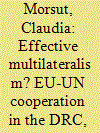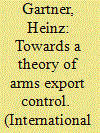| Srl | Item |
| 1 |
ID:
087832


|
|
|
|
|
| Publication |
2009.
|
| Summary/Abstract |
This article examines the EU's partnership with the UN in building effective multilateralism through an analysis of the EU operations in the Democratic Republic of Congo (DRC) between 2003 and 2006. The EU has offered a range of tools in the field of civilian and military crisis management to MONUC, the UN Organization Mission in the DRC, thus representing the first case of full partnership on the ground between the two organizations. This pioneering peace operation can offer insights into possible future collaboration between the two organizations in peace and security matters. The argument of the article is that it is possible to establish a 'partner model' from the example of cooperation in the DRC: in the case of a UN deficit, the EU may intervene as supporting organization. However, since the EU is keen to be considered as an independent global actor, it seems focused on a pragmatic rather than institutionalized approach in its cooperation with the UN.
|
|
|
|
|
|
|
|
|
|
|
|
|
|
|
|
| 2 |
ID:
145772


|
|
|
|
|
| Summary/Abstract |
This article investigates the notion of ‘lateralisms’ and how various modes of engagement (namely bilateralism, regionalism and multilateralism) relate to one another. It begins with a careful analysis of the evolution of ‘lateralisms’ and their (in)compatibility at the global level, building on the existing literature from multiple research disciplines. The second part of this article focuses specifically on the European Union's (EU's) foreign policy approach. The author puts forward two main hypotheses. First, the EU has performed a rebalancing act between bilateralism and regionalism/multilateralism over the last decade in favour of the former, notably through the deepening of its so-called ‘strategic partnerships’. Second, this enhanced bilateralism is not necessarily compatible with other ‘lateralisms’, as it can at times undermine regional integration processes or the building of an effective multilateral order. The author eventually formulates some recommendations to ensure that bilateral partnerships are geared towards the strengthening of the multilateral fabric which remains the EU's fundamental and long-term objective.
|
|
|
|
|
|
|
|
|
|
|
|
|
|
|
|
| 3 |
ID:
096060


|
|
|
| 4 |
ID:
098467


|
|
|
|
|
| Publication |
2010.
|
| Summary/Abstract |
The Wassenaar Arrangement (WA) is a multilateral regime designed to control exports of conventional arms and dual-use goods and technologies to contribute to regional and international security and stability. Unlike traditional arms control and disarmament agreements WA is not legally binding. It has to rely on cooperation and voluntary compliance of the actors concerned - principally states and industries. For them the WA provides guidance for cooperation and compliance. The question is whether the actors involved are interested in complying with the guidelines. The article applies two IR theories to address this question, liberal institutionalism and realism. One argument of liberal institutionalism is that international institutions and regimes not only have a vital catalytic role to play in promoting cooperation among states, but they also develop synergetic effects and reinforce each other in the framework of effective multilateralism. In many ways this might well be the case, but the opposite is also true. The economic interests of member states and jealousy between them have long hampered cooperation among the various regimes that have been designed to act as the multilayered export control and non-proliferation system that all involved have agreed is necessary. But it is not only liberal institutionalism that fails to explain the behavior of states, international institutions and regimes. For realists, it is states' interests that matter, with common norms, rules and principles mattering less, if at all. But contrary to the realist argument, states do also support the general guidelines and best practices of the international institutions that have been created to avoid the destabilizing effects of the accumulation of certain categories of conventional arms and the proliferation of dangerous weapons. Neither realism nor liberal institutionalism is fully able to capture the complex relationship between the interests of individual countries and general principles and norms. The diplomatic delegations in multilateral fora have the difficult task of identifying the cumulative interests of the countries they represent. They have to support and reject cooperation with states and other export control regimes and institutions, often at the same time.
|
|
|
|
|
|
|
|
|
|
|
|
|
|
|
|